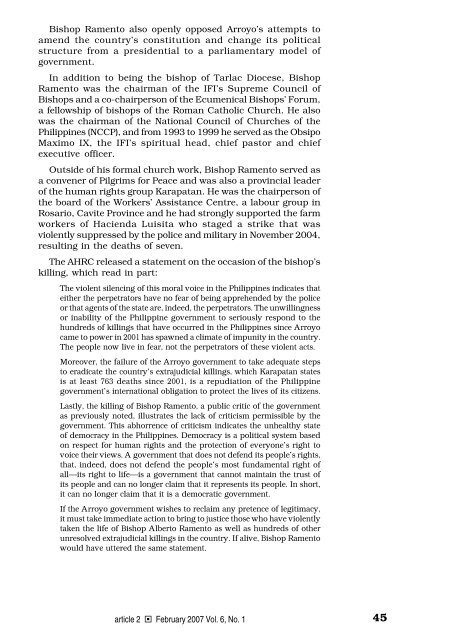of the Philippines the criminal justice system is - Article 2
of the Philippines the criminal justice system is - Article 2
of the Philippines the criminal justice system is - Article 2
You also want an ePaper? Increase the reach of your titles
YUMPU automatically turns print PDFs into web optimized ePapers that Google loves.
B<strong>is</strong>hop Ramento also openly opposed Arroyo’s attempts to<br />
amend <strong>the</strong> country’s constitution and change its political<br />
structure from a presidential to a parliamentary model <strong>of</strong><br />
government.<br />
In addition to being <strong>the</strong> b<strong>is</strong>hop <strong>of</strong> Tarlac Diocese, B<strong>is</strong>hop<br />
Ramento was <strong>the</strong> chairman <strong>of</strong> <strong>the</strong> IFI’s Supreme Council <strong>of</strong><br />
B<strong>is</strong>hops and a co-chairperson <strong>of</strong> <strong>the</strong> Ecumenical B<strong>is</strong>hops’ Forum,<br />
a fellowship <strong>of</strong> b<strong>is</strong>hops <strong>of</strong> <strong>the</strong> Roman Catholic Church. He also<br />
was <strong>the</strong> chairman <strong>of</strong> <strong>the</strong> National Council <strong>of</strong> Churches <strong>of</strong> <strong>the</strong><br />
<strong>Philippines</strong> (NCCP), and from 1993 to 1999 he served as <strong>the</strong> Obsipo<br />
Maximo IX, <strong>the</strong> IFI’s spiritual head, chief pastor and chief<br />
executive <strong>of</strong>ficer.<br />
Outside <strong>of</strong> h<strong>is</strong> formal church work, B<strong>is</strong>hop Ramento served as<br />
a convener <strong>of</strong> Pilgrims for Peace and was also a provincial leader<br />
<strong>of</strong> <strong>the</strong> human rights group Karapatan. He was <strong>the</strong> chairperson <strong>of</strong><br />
<strong>the</strong> board <strong>of</strong> <strong>the</strong> Workers’ Ass<strong>is</strong>tance Centre, a labour group in<br />
Rosario, Cavite Province and he had strongly supported <strong>the</strong> farm<br />
workers <strong>of</strong> Hacienda Lu<strong>is</strong>ita who staged a strike that was<br />
violently suppressed by <strong>the</strong> police and military in November 2004,<br />
resulting in <strong>the</strong> deaths <strong>of</strong> seven.<br />
The AHRC released a statement on <strong>the</strong> occasion <strong>of</strong> <strong>the</strong> b<strong>is</strong>hop’s<br />
killing, which read in part:<br />
The violent silencing <strong>of</strong> th<strong>is</strong> moral voice in <strong>the</strong> <strong>Philippines</strong> indicates that<br />
ei<strong>the</strong>r <strong>the</strong> perpetrators have no fear <strong>of</strong> being apprehended by <strong>the</strong> police<br />
or that agents <strong>of</strong> <strong>the</strong> state are, indeed, <strong>the</strong> perpetrators. The unwillingness<br />
or inability <strong>of</strong> <strong>the</strong> Philippine government to seriously respond to <strong>the</strong><br />
hundreds <strong>of</strong> killings that have occurred in <strong>the</strong> <strong>Philippines</strong> since Arroyo<br />
came to power in 2001 has spawned a climate <strong>of</strong> impunity in <strong>the</strong> country.<br />
The people now live in fear, not <strong>the</strong> perpetrators <strong>of</strong> <strong>the</strong>se violent acts.<br />
Moreover, <strong>the</strong> failure <strong>of</strong> <strong>the</strong> Arroyo government to take adequate steps<br />
to eradicate <strong>the</strong> country’s extrajudicial killings, which Karapatan states<br />
<strong>is</strong> at least 763 deaths since 2001, <strong>is</strong> a repudiation <strong>of</strong> <strong>the</strong> Philippine<br />
government’s international obligation to protect <strong>the</strong> lives <strong>of</strong> its citizens.<br />
Lastly, <strong>the</strong> killing <strong>of</strong> B<strong>is</strong>hop Ramento, a public critic <strong>of</strong> <strong>the</strong> government<br />
as previously noted, illustrates <strong>the</strong> lack <strong>of</strong> critic<strong>is</strong>m perm<strong>is</strong>sible by <strong>the</strong><br />
government. Th<strong>is</strong> abhorrence <strong>of</strong> critic<strong>is</strong>m indicates <strong>the</strong> unhealthy state<br />
<strong>of</strong> democracy in <strong>the</strong> <strong>Philippines</strong>. Democracy <strong>is</strong> a political <strong>system</strong> based<br />
on respect for human rights and <strong>the</strong> protection <strong>of</strong> everyone’s right to<br />
voice <strong>the</strong>ir views. A government that does not defend its people’s rights,<br />
that, indeed, does not defend <strong>the</strong> people’s most fundamental right <strong>of</strong><br />
all—its right to life—<strong>is</strong> a government that cannot maintain <strong>the</strong> trust <strong>of</strong><br />
its people and can no longer claim that it represents its people. In short,<br />
it can no longer claim that it <strong>is</strong> a democratic government.<br />
If <strong>the</strong> Arroyo government w<strong>is</strong>hes to reclaim any pretence <strong>of</strong> legitimacy,<br />
it must take immediate action to bring to <strong>justice</strong> those who have violently<br />
taken <strong>the</strong> life <strong>of</strong> B<strong>is</strong>hop Alberto Ramento as well as hundreds <strong>of</strong> o<strong>the</strong>r<br />
unresolved extrajudicial killings in <strong>the</strong> country. If alive, B<strong>is</strong>hop Ramento<br />
would have uttered <strong>the</strong> same statement.<br />
article 2 • February 2007 Vol. 6, No. 1 45

















